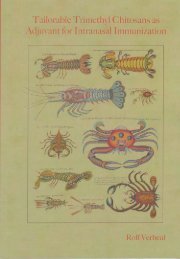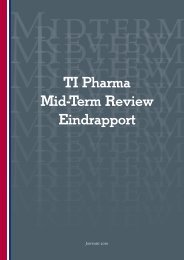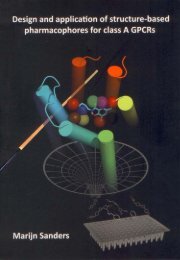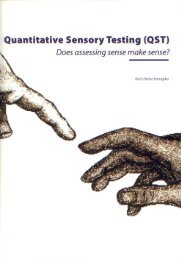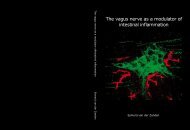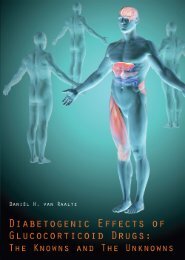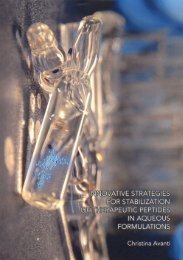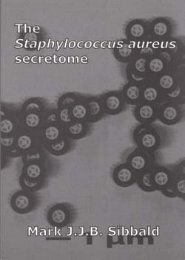Experimental infection and protection against ... - TI Pharma
Experimental infection and protection against ... - TI Pharma
Experimental infection and protection against ... - TI Pharma
Create successful ePaper yourself
Turn your PDF publications into a flip-book with our unique Google optimized e-Paper software.
216 Chapter 11<br />
The development of a highly efficacious malaria vaccine faces many hurdles, key<br />
to which is our limited knowledge of what exactly constitutes <strong>protection</strong> <strong>against</strong><br />
Plasmodium falciparum malaria in humans. Malaria vaccine development relies<br />
on a trial-<strong>and</strong>-error approach, with many c<strong>and</strong>idates in (pre-)clinical<br />
development awaiting efficacy testing in the field. This thesis focuses on the<br />
development of research tools that facilitate immunological <strong>and</strong> vaccine<br />
research into human <strong>protection</strong> <strong>against</strong> Plasmodium falciparum malaria in early<br />
stages of clinical development. We used the following approaches:<br />
Firstly, we tested an asexual erythrocytic stage subunit vaccine c<strong>and</strong>idate (Apical<br />
Membrane Antigen 1) for its safety <strong>and</strong> immunogenicity in humans <strong>and</strong><br />
performed in depth analysis of the humoral immune response following<br />
immunization.<br />
Secondly, we assessed <strong>and</strong> optimized an important tool for malaria vaccine <strong>and</strong><br />
immunological research: controlled human malaria <strong>infection</strong>s. In these trials,<br />
healthy malaria-naïve volunteers are exposed to infectious mosquito bites in<br />
order to test the preliminary efficacy of vaccine c<strong>and</strong>idates or in order to<br />
perform immunological research.<br />
Thirdly, we developed a human model for <strong>protection</strong> <strong>against</strong> Plasmodium<br />
falciparum malaria to facilitate immunological research <strong>and</strong> facilitate the<br />
development of a whole-sporozoite vaccine for malaria.<br />
Apical Membrane Antigen 1 (AMA1)<br />
AMA1 is considered a promising vaccine c<strong>and</strong>idate, primarily due to a large body<br />
of data from animal studies indicating that AMA1 can induce immune responses<br />
capable of inhibiting the blood stage parasite multiplication in vitro <strong>and</strong> in vivo<br />
(reviewed in [1]). Specifically, <strong>protection</strong> can be conveyed by transferring anti-<br />
AMA1 antibodies [2-5] <strong>and</strong> epidemiological studies in malaria endemic areas<br />
show that the presence of AMA1 antibodies correlate with malaria <strong>protection</strong> [6,<br />
7]. Subsequently, AMA1 has been produced as recombinant protein both in<br />
Pichia pastoris <strong>and</strong> E. Coli. Animal studies showed satisfactory pharmacotoxicity,<br />
so the whole-length (amino acid 25 to 545) Pichia pastoris-expressed AMA1<br />
from the FVO strain has been taken forward into the first phase of clinical<br />
testing. We showed that PfAMA1[25-545] FVO can be safely administered to<br />
humans <strong>and</strong> is immunogenic (Chapter 2). We also showed that both<br />
reactogenicity <strong>and</strong> immunogenicity are dependent on the adjuvant, with the



